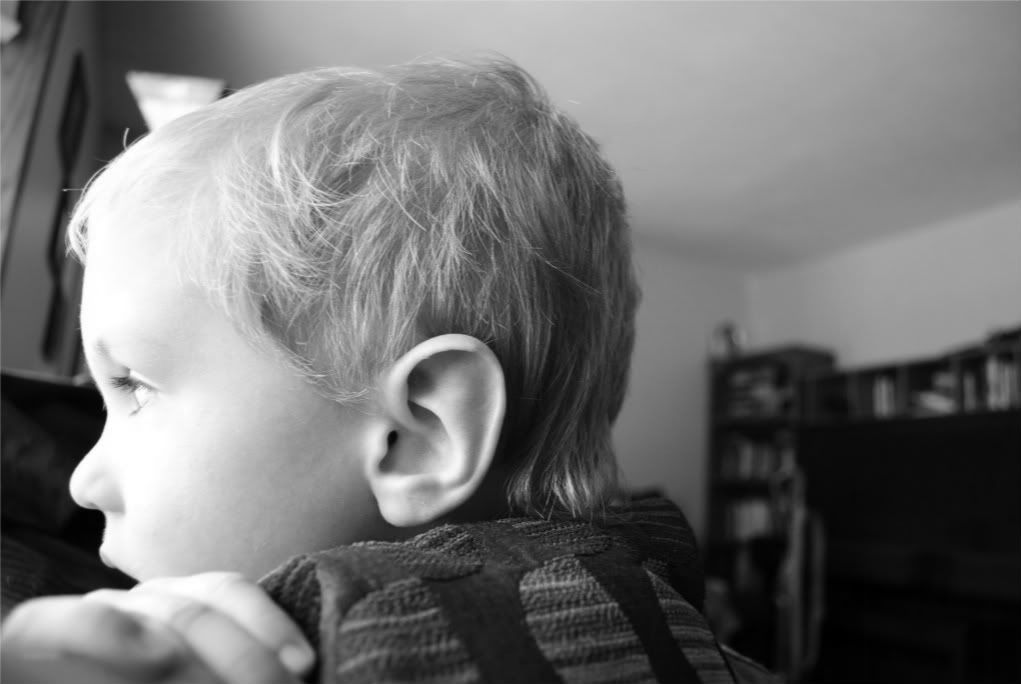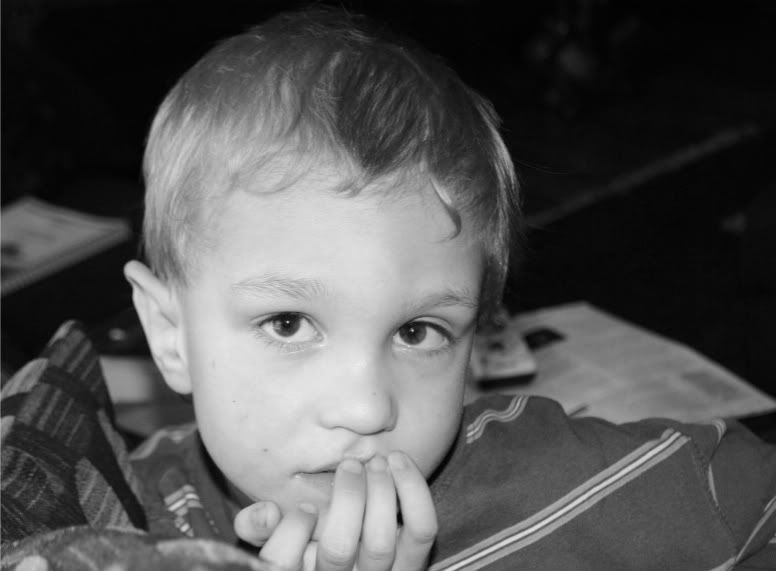The boys missed us. Upsets, aggressions, and behaviors are up, as our therapists would report from their careful data! But hugs and cuddles are up, too!
I think it will take awhile to ponder and process everything I learned at the conference. A huge burst of information taken in over a period of four long days! Thankfully I took notes and for the most part can read my own scribble.
One of the sessions I went to struck me with a bit of panic. The speaker commented that when our children are small we are so concerned with language and sensory issues, we make fine motor skills a lower priority. Eeeeek, that's me! We should actually have them use a pen/pencil/crayon of some sort every day. Write, color, draw, scribble, whatever, just so long as they are learning how to hold a writing utensil properly. She said many of us think (yep, including me) that our kids can just use keyboards, they won't have to learn to write by hand. The truth is, holding a pencil and having the control to make a line on a paper purposefully is an important developmental skill. A skill they should be working on every single day.
In this same session there was a video of a boy who looked exactly my boys' age, being shown flashcards with words and pictures on them; for example, it would say "SUN" and then there'd be a picture of the sun. That boy knew every word.
Then the cards were flipped over and on the opposite side there was just the word -- no pictures. Well, that boy became agitated and downright angry, trying to grab the cards out of the therapist's hands. She held firm and eventually he said the words as she flipped through the cards. He still knew each of those words without seeing the picture -- he just wanted to see the picture. He continued to be annoyed that she wouldn't turn the cards over, but he read through the whole stack.
Here's a statistic I hadn't heard before -- if you know 200 words by sight, you can read. Simple, first-reader books, obviously, but you can read! I thought, I bet AJ is well on his way to knowing 200 words.
I searched online a bit but couldn't find any free flashcards that were exactly what I wanted, so I'm making my own in MS Publisher. Now, I just have to score a laminating machine.....
The other session I found helpful was the one on talking to your children's fellow classmates at school about Fragile X. It's very important to me that my kids find acceptance and even friendship from their peers. I'm going to talk to Zack & AJ's kindergarten class about them, and I need to be exceptionally prepared. Before I go in there I'm going to know almost word for word what I'm going to say. And I need to be prepared for tough questions. Like, why does Zack bite?
Holly Roos gave such great pointers and sample things to say. You begin by talking about what kinds of toys the boys like that other kids like, too. Like firetrucks. Who likes playing with a firetruck? All the kids, boys at least, will say they like that. Then I'll talk about how some firetrucks have lights and sirens and do all kinds of things like that. Some trucks don't have the lights and sirens, some of them require that YOU make the sirens sounds while you play with it. But those are still fun to play with, right?
Here is where I hope the kids say "YES!" Because then I compare Zack & AJ and other kids with autism to the trucks that don't make noises or have lights. You have to play with them a different way, because they don't work like the others.
Another really eye-opening session I attended was about participating in clinical trials. They reviewed the different phases, what happens in each, how long they might last, and what they look for in test participants. They discussed placebo medications, how they work, and why it's just as important to the study for some kids to be on the placebo as to be on the actual trial drug.
I thought it was interesting that they do sometimes prefer to test the more severely affected patients, in hopes they'll see the most dramatic results from those patients. At the same time, the more severely affected patients can't report results as accurately, and the study relies more on the caregivers to report results. It had not even occurred to me that there were patients participating in studies who can report personally how they are doing!
Finally, it was pointed out that we should consider carefully why we are participating in the study. Is our motivation simply to help our children, or do we honestly want to advance the research? Apparently there are occasions where a study participant's parent will pull them from one study in order to participate in another study they think might offer more dramatic help for their child. They understand why parents might do that, but it obviously hurts the process and prolongs the length of an already years-long drug testing trials.
Subscribe to:
Post Comments (Atom)
Labels
#youmightbeanautismparentif
2012 in review
9/11 memories
ABA therapy
Acceptance
acronyms
advocacy
affection
aggression
AJ
Aliza
Aliza the playwright
All I really need to know...
Alphabitty Moments
American Girl
Ann Coulter
antibullying
anxiety
anxiety in parents of children with special needs
apple orchard
apps for autism
AppSmitten
Arbaclofen
Arbitrary Thoughts
ARC
autism
autism brushing
autism portrayed in TV shows
Autism Shines
awareness
backyard
band
baseball
bath toys
beds
behavior problems
being tall
Birthday Boys
biting
blog change
blog hop
blogging
books
bottles
brushing
bubbles
Burnsville Fire Muster
bus
Cabin Fever in Minnesota
candy
Carly Fleischmann
Carly's Voice
cats
cats and dogs
chewys
Chicago
childcare for special needs children
childhood
Children's Museum
chocolate
Christmas
Church
circumin
clinical trials
Clonidine
CNN Hero of 2011
coffee
communication
comparisons
computer
Conference
cost of special education
Courage Center
Curcumin
daddy
dance
dance competition
dance moms
Dental surgery
dentist
developmental milestones
diagnosis
diapers
Diego
Disability Day
dogs
Dolphin Tale
Doomsday Preparation
Dora
Doritos
drug trials
DVD player
early intervention
earrings
Easter
ECSE Parent Retreat
electronic gadgets
electronics
Everything I need to know...
Evil Overlord
fall
falling asleep at school
families
family
fashion
fear
Featured
Feel Good Friday
field trip
fireworks
first day of school
Flash Gordon
Food Chronicles
food issues in Fragile X and autistic children
forms
forts
Fragile Face of God
Fragile X
Fragile X advocate
Fragile X and autism
Fragile X Awareness Day
Fragile X carriers
Fragile X in the news
Fragile X presentation
Fragile X statistics
Fragile X Writers
friends
fundraiser for Fragile X
funniest
Funny
Gabrielle Giffords
Galveston
games
getting carsick
Girls' Night Out
Giving Spirit
glasses
global warming
going home
Good Morning
Great Quotes
guest blogs
guest post
haircuts
Halloween
hearing test
Heaven is for Real
hippotherapy
holidays
Holland
Holly
home life
homework
hotel
hugging
human behavior
hyperactivity
IEP Meeting
IEPs
in the news
inclusion
inspiration
integration
iPad
iPad apps
iPad apps for autism
IQ testing
Jack Jablonski
January First
Joke
journal entry
kids with Fragile X and animals
Kindergarten
Kindle
kisses
language study
learning to talk
leaves
lemonade stand
Lily
Little Einsteins
losing teeth
Mad Gab
makeup
mall
Mall of America
marcia braden
McDonalds
media sensationalization
medications
Melatonin
Miami
MIND Institute
Minnesota Bloggers Conference
minocycline
Miracle League
monkeys
mosquito bites
Mother's Day
movies
MVMOM Used Clothing and Equipment Sale
nail trimming
names
naughtiness
neighbors
nicknames
nightmares
normal
off topic
one thing leads to another
online dating
Operation Beautiful
oral sensory
orphan drug act
other bloggers
Our Wedding
outside
overstimulation
panic attacks
parade
parental stress
Parenthood
park
Partners in Policymaking
penicillin
people with disabilities
pets
pharmacy fun
photography
Photoshop
picnic
Pictures
pinching
pink shirt
Pinterest
playing outside
playing with toys
poem
politics
poop
potty training
Presents
protecting autistic children
rash
reading to kids
research
Retreat
riding a bike
Robin Williams
Roger Ebert
routine
RSS feed
RUSH University
San Diego
Sandy Hook Elementary
Santa
schedules
school
school bus
school notes
school pictures
screaming
self image
self-checkouts
sensory
Seroquel
siblings with developmental delays
sick kids
sippy cups
sleep
smile
snow pictures
Snowstorm
social situations
speaking of the unspeakable
special education
special education evaluation
special needs kids
special needs parents
Special Needs Ryan Gosling
Special Olympics
spelling
spoon feeding
spring break
staying positive
stimming
Strep
STX209
Stylish Blog Award
suicide
summer
Sunday School
Sundays
sunshine
survival mode
swimming
talking
talking to kindergarteners
Target
teacher's aides
Teeth brushing
Tegretol
Temple Grandin
Ten Commandments
textbook case of Fragile X
thankful
thanksgiving
that window/mirror thing
The Autism Store
The R Word
the rapid passage of time
The Right Things to say to parents of special needs children
The Santa Experience
the Shedd Aquarium
The Twin Thing
The Wiggles
therapeutic horseback riding
therapy
This is Autism
topless
trampoline
traveling with special needs children
TV
twins with special needs
Twitter
typical Fragile X characteristics
typical kids
typing
vacation
Vacation Bible School
video games
videos
volunteering
Waisman Center
water play
way-back-Wednesday
What I've Learned
What's your song?
when a special needs parent dies
Wiggles
Wii games
Winner Winner Chicken Dinner
winter
wonder
Wonder Pets
Wordful Wednesday
Wordless Wednesday
Words of Wisdom
World Autism Awareness Day
YMCA
You Tube
Zack
Zoloft
zoo animals
Fragile X Blogs
-
-
in between smile lines8 months ago
-
THANKFUL AT EXIT 3671 year ago
-
3 months. 11 years wasn't enough.5 years ago
-
Just Goals. Not Resolutions.7 years ago
-
Ramble On8 years ago
-
I scared.8 years ago
-
-
A Blake Funny9 years ago
-
North Carolina Snow Day10 years ago
-
Make Room for Our Awesome Little Weirdo10 years ago
-
Sad face... ; - (10 years ago
-
-
Kindness, in bulk10 years ago
-
Taking time to play in the snow10 years ago
-
No holding back10 years ago
-
Managing the day11 years ago
-
Balance bike11 years ago
-
Fragile X Awareness Day 201411 years ago
-
-
Thank You11 years ago
-
And the mama claws come out12 years ago
-
A review of almost two years12 years ago
-
Tell Me a Story…12 years ago
-
Stop? Never!12 years ago
-
The Things I've Learned12 years ago
-
valentines fun and recipes13 years ago
-
teammates13 years ago
-
My Turn To Release13 years ago
-
The Connector to the Rescue!13 years ago
-
-
-
-
New Fragile X drug?15 years ago
-
-
Special Needs Blogs
-
Day Program9 months ago
-
-
-
-
-
-
An AAC WWYD, for the professionals8 years ago
-
-
Risk Factors You Control8 years ago
-
Spectacular Six9 years ago
-
-
Fall Fail10 years ago
-
-
How Television Benefits Your Children14 years ago
-
-
-



2 comments:
Wow, even my brain is on overload just reading that entry. What a great firetruck analogy - I think talking to their class is a great idea!
Post a Comment